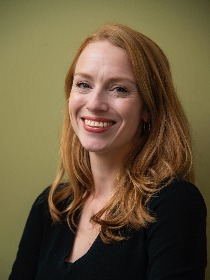Meet Your Professor: Brenda Mathijssen
In Meet Your Professor we will introduce you to the new teachers of seminars and courses at NOSTER. In this fifth episode, we introduce dr. Brenda Mathijssen (RUG), who will teach the Research Seminar on Empirical Research in Religion (together with dr. Anke Liefbroer).

How did you end up where you are now, academically speaking? What path did you take?
During my studies, I became interested in rituals, lived religion, material culture, and dealing with death. Throughout my internship and research, I realized that conducting research suits me well. I obtained my PhD at Radboud University through a mixed methods study on how people attribute meaning to death through ritualizations. The most rewarding aspect of conducting research, for me, is not only contributing to scientific discussions but also making a meaningful impact on practice and the people I work with. That’s what drives me. After a fellowship in Durham and a postdoc at Reading/Uwe/UCL, I became an Assistant Professor (UD) in Groningen. Currently, I am in the midst of an NWO Veni project, studying the emergence and meanings of natural burial grounds. Additionally, I work as Director of Education and Vice Dean at my faculty, where I am also involved in organizing and shaping the future of research and higher education, especially in theology and religious studies.
What result has stayed with you the most?
There are several things that have stayed with me. For instance, while working in England, I collaborated with colleagues on the “deathscapes and diversity” project, where we investigated funeral facilities for minorities and migrants in England and Wales. The research revealed that inadequate funeral facilities not only negatively affected the well-being of the bereaved but also impacted the well-being of the deceased, at least as perceived by their loved ones. “When the deceased are at peace, the living have peace as well.” The practical impact of this finding has stuck with me, and it has helped me better understand ritualization surrounding the end of life.
Which themes are addressed in your module at NOSTER?
The module covers various aspects of empirical research, from qualitative to quantitative methods, technical aspects of conducting research, to more philosophical questions about the researcher’s positionality. We also discuss the participants’ doctoral research.
Why is your module at NOSTER so enjoyable/interesting?
It’s a great module for anyone actively engaged in empirical research because it invites you to reflect on methods and techniques and engage in discussions with your colleagues. Personally, I find the diversity of paradigms and methods highly interesting. We don’t always agree with each other, but you can learn a lot from people with different approaches.
What do you notice about your students? Do you notice certain interests, perspectives or working methods that are characteristic of this generation of theologians/religious scholars?
The module primarily reflects the broad range of topics that theologians and religious scholars nowadays are engaged with, from religious experiences to cultural heritage.
What advice would you like to give to young researchers in religious studies/theology?
Discover and develop your talents and interests, both within academia and beyond!